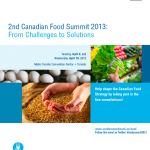Hannah Renglich in Rabble: Industry Voices Dominate at Canadian Food Summit
Posted: April 22, 2013
Categories: Food Strategies / News from Sustain Ontario / Nouvelles / Policy News
 In a recent piece for Rabble.ca, Hannah Renglich offered a strong critique of the 2nd Annual Canadian Food Summit, held in Toronto and organized by the Conference Board of Canada with the aim of developing strategies for realizing the greatest economic potential for Canada’s food sector.
In a recent piece for Rabble.ca, Hannah Renglich offered a strong critique of the 2nd Annual Canadian Food Summit, held in Toronto and organized by the Conference Board of Canada with the aim of developing strategies for realizing the greatest economic potential for Canada’s food sector.
Similar to a Sustain Ontario’s recent coverage of the Canadian Food Summit, Renglich offered strong criticism of the dominant presence of industry voices at the summit, which the author argues excludes the voices and interests of average Canadians in developing a national food strategy. Renglich writes,
The Summit purported to be a platform to “engage delegates in refining the draft Canadian Food Strategy,” which is being developed by the Centre for Food in Canada (CFIC). It costs $11,400 annually to join the Centre for Food in Canada’s Steering Committee as a participant investor, which buys you passes to biannual meetings and special events, access to research findings, and the right to offer input on the choice of research and meeting topics.
If you hope to have more say, you can contribute $50,000 annually to become a Champion Investor, which grants you the right to define the research agenda for CFIC, access research results before public release, and advise CFIC in its planning and decision making.
Renglich also noted that in her view, summit participants did little to address the issue of household food security:
It may be that we are all afraid — both industry and civil society — but for very different reasons and of very different outcomes. Perhaps to appease the strident voices of citizen groups and non-profit participants, a session on Household Food Security was included on Day 2 of the Summit, at the beginning of which there was an exodus of nearly half the plenary’s participants. An industry statement? Of the remaining audience, in an instant poll asking if they would consider including action in their business to further household food security, 18 per cent said no and 16 per cent said maybe.
Renglich’s piece can be read in its entirety here.
***The views expressed by Renglich and highlighted here are strictly those of the author. By sharing this piece, Sustain merely hopes to add to the dialogue concerning a national food strategy and does not necessarily endorse all points made in Renglich’s piece.
